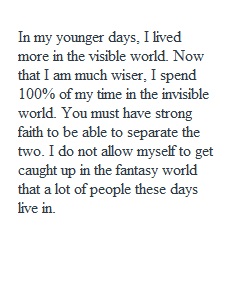


Q Joseph’s dying words declare whose side Joseph was on. Joseph lived in Egypt ninety-three years. During that time he must have seemed to be conformed to Egypt in every outward way. He served an Egyptian king. He bore an Egyptian title. He had married an Egyptian wife. He would have shared in every honorable form of Egyptian court life, politics, and trade. Yet Joseph was no Egyptian, especially in his heart. Most of us are like Joseph. We do not have the luxury of a detached existence. We are in the melting pot of life, and we sometimes think that, because our lives are busy and our environments secular, we cannot live for God as “spiritual” people do. If we are inclined to think that way, we should remember Joseph. Joseph was surrounded by every secular pressure. He was a citizen of the world. But his conduct throughout his entire life, as well as his dying words, proved that he did not live for the material things life can bring, but for God and his kingdom and glory. If Joseph lived like that in his circumstances, we can live for God in ours. We can endure and triumph as those whose eyes see things that are invisible. What keeps one godly in a comfortable world? Two things! First, the invisible must be often, if not always, in our thoughts. If we do not fill our minds with spiritual realities, secular dreams will take true religion’s place and our horizons will shrink to what is now but will surely pass away. The sense of God’s presence will recede. Prayer will become unreal. If we would triumph, as Joseph did, we must think of God and his kingdom often, and we must associate with and encourage others who think the same. Second, the invisible must be always in our wishes. That is, we must look for God’s kingdom and pray that it might come, as Jesus instructed. Joseph did this. All through the long years of his Egyptian service, though his body was in Pharaoh’s country, his mind was in Canaan and he looked forward to that day when his bones should be carried out of Egypt and be buried there in anticipation of the final resurrection and fulfillment of God’s promise. Should we do less, we to whom the promises have been made even clearer and who have in addition the sure and certain knowledge of our Lord’s own resurrection? If that resurrection is uppermost in our wishes, we will live for eternity now and will make a powerful impact on earth. Boice, James Montgomery. Come to the Waters: Daily Bible Devotions for Spiritual Refreshment (Kindle Locations 970-994). Baker Publishing Group. Kindle Edition. What occupies your thoughts and wishes - the invisible Kingdom of God or the visible world in which you move and breathe?
View Related Questions